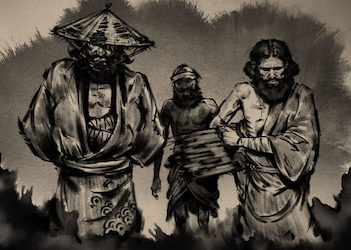
Burakumin (部落民, ‘hamlet/village people’). The Japanese people commonly believed to be descended from members of the pre-Meiji feudal class who were associated with regard (穢れ, ‘defilement’), such as executioners, undertakers, slaughterhouse workers, butchers, and tanners. The term encompasses both the historical eta and hinin outcasts.
During Japan’s feudal era, these occupations acquired a hereditary status of oppression, and became an unofficial class of the Tokugawa class system during the Edo period. After the feudal system was abolished, the term burakumin came into use to refer to the former caste members and their descendants, who continue to experience stigmatization and discrimination.
Several scholars have drawn parallels between the Burakumin of Japan, the Baekjeong of Korea, the Dalit of South Asia, and the peasant class of the medieval European feudal system.